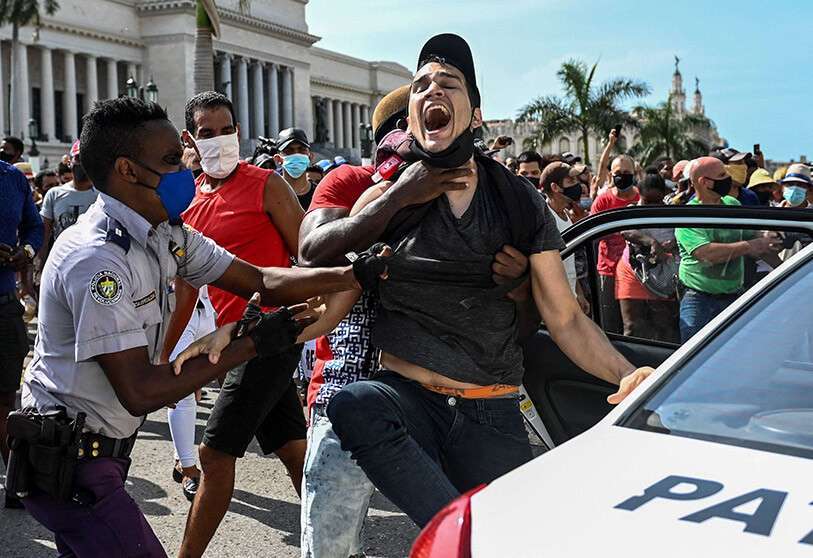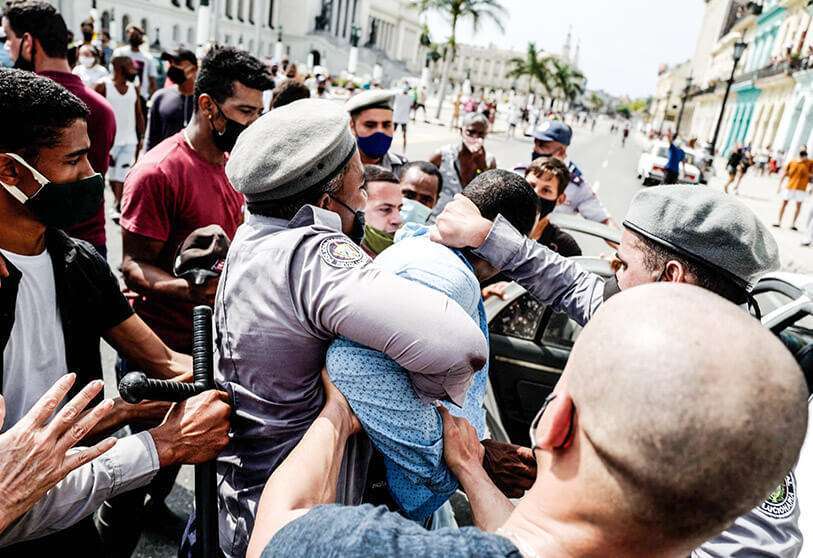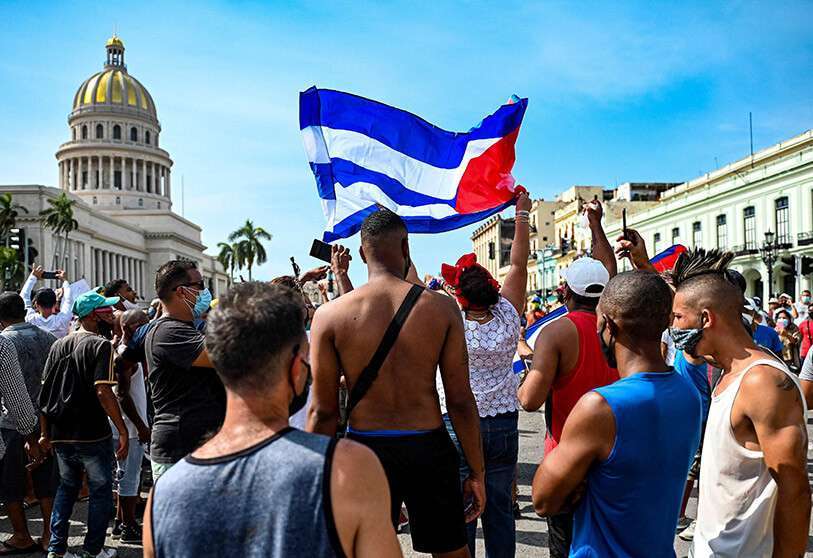Cuba, a reflection of the biggest social protest since the revolution

Word of what was happening in San Antonio de los Baños soon spread throughout Cuba. Unusual cries of "freedom" and "down with the dictatorship" could be heard in Old Havana and elsewhere in Cuba, amplified by social media, which in recent months has shaken up the political landscape. This is the largest anti-government protest on the island since the so-called "maleconazo", when in August 1994, during the so-called Special Period, hundreds of people took to the streets of Havana to protest the precarious economic situation on the eve of the outbreak of the raft crisis. The protests culminated on 6 August, when then-President Fidel Castro was present at one of the demonstrations, where he managed to calm things down and get people to go home. Since then, preventing another such outbreak has been one of the Cuban regime's main obsessions.

But in recent years the economic situation in Cuba has only worsened. The trigger for this demonstration in which thousands of people took part is the severe shortages and hardship suffered by the island's inhabitants, aggravated by the effects of the pandemic. The protests began in the small Havana town of San Antonio de los Baños, a small town of 50. 000 inhabitants about 30 kilometres from Havana, where hundreds of people took to the streets because of the long blackouts they suffer and in demand of being vaccinated, but asking for "freedom" and political changes, a protest that in a few minutes reached Facebook and was broadcast live, generating calls for more demonstrations on social networks that spread to the eastern town of Palma Soriano, in Santiago de Cuba, in Alquízar and elsewhere to the rhythm of the controversial song Patria y Vida, which has become a symbol of those who disagree with Castroism. However, the Cuban government opted to cut off internet access, but by then the calls were already spreading by word of mouth. The situation on the island and information on where demonstrations and other events are taking place is confusing due to the constant cuts in internet and mobile phone services, which depend on a state monopoly.

All this has coincided with the consolidation of the so-called San Isidro Movement, a wave of artistic activism of a political nature that denounces the persecution of dissident artistic expression, to which the regime has reacted with harassment and, in some cases, imprisonment. The movement has had considerable repercussions within Cuba itself, especially among many of its intellectuals, even among those who do not agree with its ideological approaches, but who defend the need for freedom of expression.
The proof of the extent of the unrest is that in several of these places the police have refused to intervene against the demonstrators. This, paradoxically, increases the risk of the situation turning violent: in some places, the task of dealing with the demonstrators has fallen to the elite group of the Revolutionary Armed Forces of Cuba (FAR), known as the "black berets", a shock squad with which the dictatorship usually represses the unarmed population of the island by force and which, whenever they take to the streets, their actions end in violent acts against defenceless citizens.

Cuba suffers an everlasting economic crisis, aggravated by the pandemic, which has provoked a new wave of repression by the authorities. COVID-19 is breaking records every day on the island, where the number of positive cases and deaths from the pandemic has multiplied exponentially, bringing provinces such as Matanzas to the brink of health collapse with a rate of more than 1,300 infected per 100,000 inhabitants. Underlying this situation is the great popular discontent due to the serious crisis the country is going through, with endless queues to buy basic necessities and an acute shortage of medicines, which have generated strong social unrest. The economic difficulties have also led the authorities to implement power cuts of up to six hours a day in large parts of the country.
Cuba is the smallest country in the world to develop its own vaccines. The island could be the first country in the world to be able to cover all its needs with vaccines produced in-house. Cuba is currently working on five vaccine candidates against COVID-19, all with patriotic names: Abdala vaccine shows 92.28% efficacy against COVID-19 after three doses and Soberana 02 reaches 62% with two injections. The island has staked everything on its own vaccines, which is why it did not participate in the WHO's Covax mechanism or purchase them on the international market. Despite being mired in a major economic crisis and having been subjected to a decades-long US trade embargo, it weathered the pandemic in 2020, but since reopening the island to tourism there has been a significant increase in the number of cases.

Cuba has "temporarily" stopped accepting dollars in cash, in a move seen by economists as the most restrictive imposed on the US currency since it was penalised during part of Fidel Castro's government. From now on, Cubans inside the island will have to use other foreign currencies to access scarce basic goods, which can only be found in shops set up by the government some time ago and where only "freely convertible currencies" (MLC) are accepted. Several of the controversial state-run shops, which sell food and basic goods in foreign currency, were looted by spontaneous protesters, and their opening caused great public unrest as these shops concentrate most of the food and basic goods that many Cubans do not have access to because they do not receive their salaries in dollars or euros.

Reflecting official concern about the demonstrations amid shouts of "freedom! and down with the dictatorship!", Cuba's current president, Miguel Díaz-Canel went on Cuban television in a live programme in which he connected with all the country's provinces and spoke about what was happening. He assured that Cuban leaders had been "honest" with the people about the situation, which he blamed on "the measures adopted by the Trump Administration of the United States with the aim of suffocating the country's economy, to provoke a massive outbreak and call for a humanitarian intervention", and introduced a disturbing element: "The order to fight has been given, the revolutionaries should take to the streets", he harangued. Despite the regime's threats, people continued to take to the streets, with a clear message: "We are no longer afraid".

The previous US president, Donald Trump, reversed all the rapprochement measures initiated by Obama, and reduced diplomatic relations between the two countries to a minimum, imposing new and far-reaching restrictions making it difficult to send remittances from the United States. In a country whose main source of income - ahead of tourism - is the money sent by its emigrants, and which has 10% of its population in the United States, the result has been devastating.
Cuba is the victim of a perfect storm, with a combination of tightening US measures, economic collapse, the coronavirus pandemic and 60 years of dictatorship. The collapse of Venezuelan subsidies, coupled with the restrictions imposed by Donald Trump's government, have put the island in a very complicated economic situation, to which COVID-19 has finally put the nail in the coffin.
Coordinator for Latin America: José Antonio Sierra









